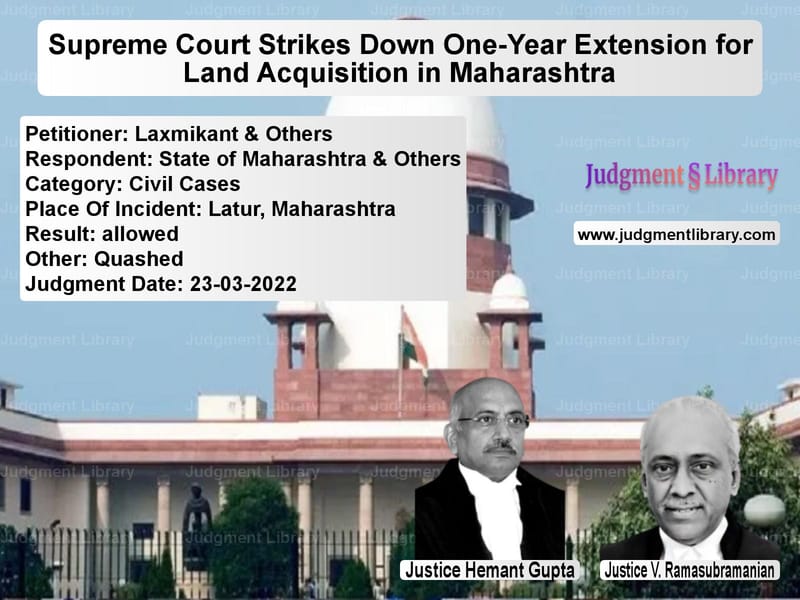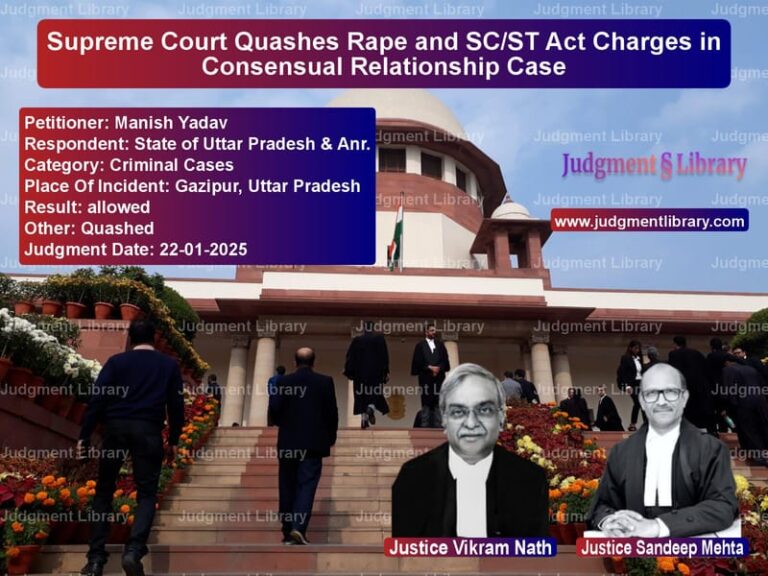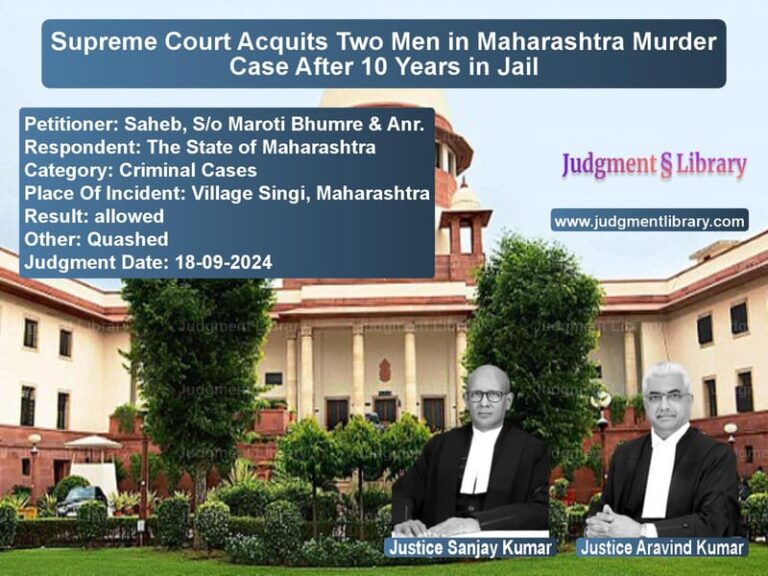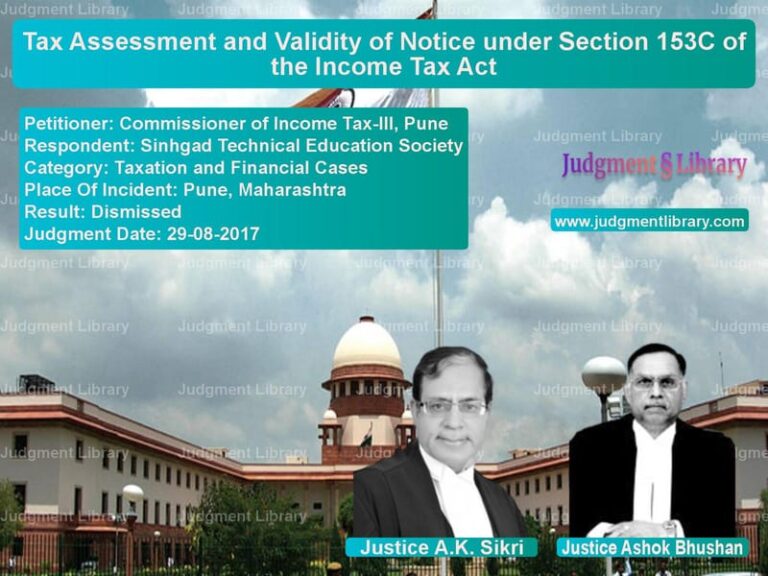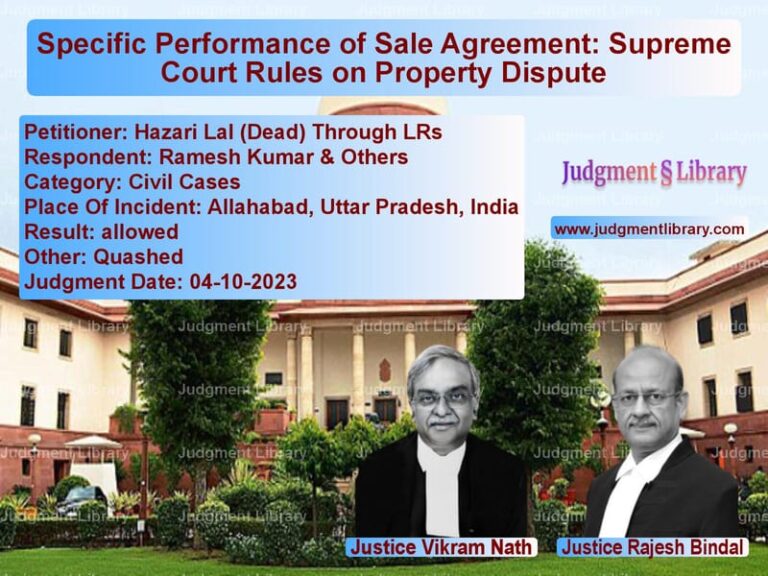Supreme Court Strikes Down One-Year Extension for Land Acquisition in Maharashtra
The case of Laxmikant & Ors. vs. State of Maharashtra & Ors. is a landmark ruling concerning the lapsing of land reservations under the Maharashtra Regional and Town Planning Act, 1966 (MRTP Act). The Supreme Court ruled that once the statutory period for acquiring land lapses, courts cannot grant additional time for acquisition.
This appeal was filed by the landowners, challenging the Bombay High Court’s decision that gave the Municipal Corporation an additional one-year extension to acquire their land. The Supreme Court struck down this extension, ruling that the government must adhere to the timelines prescribed by law.
Background of the Case
The dispute arose when the Latur Municipal Corporation designated the appellants’ land under Survey No. 73 for a public playground in the Development Plan, published on January 2, 2002. The appellants purchased portions of this land on November 21, 2002.
Read also: https://judgmentlibrary.com/supreme-court-upholds-specific-performance-in-land-sale-dispute/
Under Section 126 of the MRTP Act, the government had ten years to acquire the land. When no action was taken, the appellants served a purchase notice on August 16, 2016, requiring the government to acquire the land within one year. Despite this notice, no acquisition proceedings were initiated.
Legal Issues in the Case
- Whether land reservations lapse if the government fails to acquire them within the statutory period.
- Whether the Bombay High Court was justified in granting an additional year for acquisition.
- Whether the State can retain control over private land indefinitely without compensating the owners.
Arguments by the Petitioners (Laxmikant & Others)
The appellants contended:
- The reservation of their land lapsed after ten years, as per Section 127 of the MRTP Act.
- They served a purchase notice in 2016, but the government failed to act.
- The High Court’s decision to extend the acquisition timeline violated their property rights.
- The delay deprived them of using their land for residential purposes.
Arguments by the Respondents (State of Maharashtra & Latur Municipal Corporation)
The respondents argued:
- The land was reserved for public welfare (playground) and should not revert to private use.
- The municipal authorities had initiated proceedings but faced administrative delays.
- The High Court’s extension allowed them time to complete the acquisition process.
- Relying on Municipal Corporation of Greater Mumbai vs. Hiraman Deorukhar (2019), they claimed the court could direct the government to complete the acquisition.
Supreme Court’s Observations
The Supreme Court analyzed whether courts could grant additional time beyond the statutory limits. The Court made the following key observations:
- The MRTP Act provides a fixed timeline of ten years for acquisition, extendable by one additional year upon a landowner’s notice.
- Once this period lapses, the reservation automatically expires, and the land is free for private use.
- The High Court’s decision to grant another year for acquisition had no statutory basis.
- Municipalities cannot keep landowners in limbo by indefinitely reserving land without compensation.
- In Bangalore Medical Trust vs. B.S. Muddappa (1991), the Supreme Court held that land reserved for public purposes cannot be converted for other uses but must still be acquired within legal timeframes.
Based on these findings, the Supreme Court ruled:
- The appeal was allowed.
- The High Court’s order granting an additional year was set aside.
- The reservation of the appellants’ land lapsed under Section 127 of the MRTP Act.
- The landowners were free to use their land for residential or commercial purposes.
Legal Precedents Considered
The Supreme Court referred to multiple judgments on land acquisition:
- Bangalore Medical Trust vs. B.S. Muddappa (1991): Public land use cannot be changed arbitrarily.
- Municipal Corporation of Greater Mumbai vs. Hiraman Deorukhar (2019): Courts may direct timely acquisition but cannot extend statutory limits.
- State of Maharashtra vs. Bhakti Vedanta Book Trust (2021): Held that land reservations lapse if the government fails to acquire them.
Impact of the Judgment
This ruling has significant implications for urban planning and land acquisition:
- It prevents the government from indefinitely reserving private land without acquisition.
- It upholds landowners’ rights to use their property after statutory limits expire.
- It ensures that municipalities must act within the timeframes set by law.
- It reinforces that courts cannot override statutory deadlines for land acquisition.
By ruling in favor of the landowners, the Supreme Court reaffirmed that statutory limits on land reservations must be strictly followed and that private property rights cannot be arbitrarily curtailed.
Petitioner Name: Laxmikant & Others.Respondent Name: State of Maharashtra & Others.Judgment By: Justice Hemant Gupta, Justice V. Ramasubramanian.Place Of Incident: Latur, Maharashtra.Judgment Date: 23-03-2022.
Don’t miss out on the full details! Download the complete judgment in PDF format below and gain valuable insights instantly!
Download Judgment: laxmikant-&-others-vs-state-of-maharashtra-supreme-court-of-india-judgment-dated-23-03-2022.pdf
Directly Download Judgment: Directly download this Judgment
See all petitions in Property Disputes
See all petitions in Landlord-Tenant Disputes
See all petitions in Judgment by Hemant Gupta
See all petitions in Judgment by V. Ramasubramanian
See all petitions in allowed
See all petitions in Quashed
See all petitions in supreme court of India judgments March 2022
See all petitions in 2022 judgments
See all posts in Civil Cases Category
See all allowed petitions in Civil Cases Category
See all Dismissed petitions in Civil Cases Category
See all partially allowed petitions in Civil Cases Category

